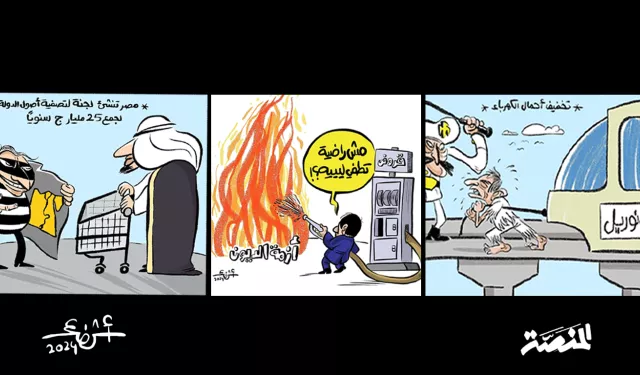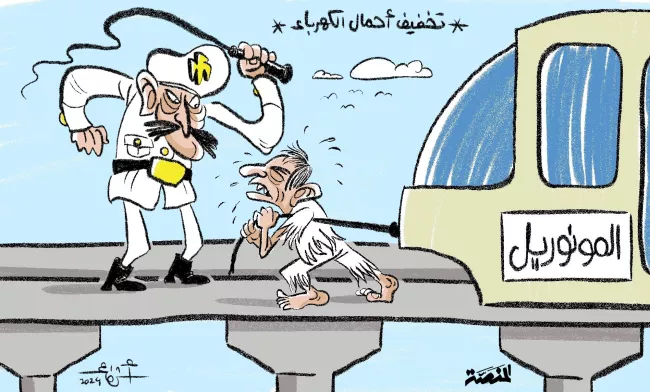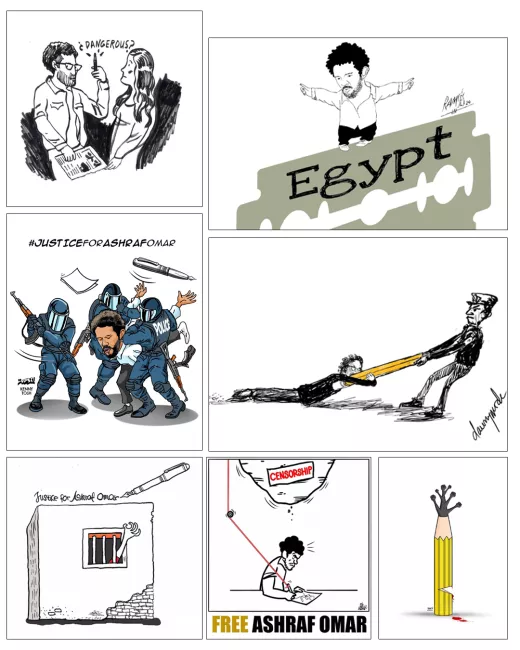
Editorial| A year in prison for Ashraf Omar, A year of zero political communication
A year has passed since the arrest of our colleague, Al Manassa's political cartoonist Ashraf Omar.
On this very day last year, Ashraf disappeared after security forces violently raided his home, subjected him to torture, and brutally tore him away from his work, family, and life.
Following his enforced disappearance, he was brought before the Supreme State Security Prosecution to face the pre-packaged, recycled charges: joining a terrorist group, etc etc.
For the past year, Al Manassa took on the duty of advocacy, relentlessly rallying support for our colleague, while continuing to publish and navigate an increasingly hostile environment for journalism. Yet, he remains detained “as a precaution,” not for a proven wrongdoing.
For a year he has been under the mercy of a system that mechanically renews his detention in perfunctory video conference hearings, turning pretrial detention into a punitive measure in itself.
The promises made by “intermediaries” and “people of influence” faded quickly, early on, before their channels of communication with those in power severed, and the so-called “political communication” withered. Political Communication that had once landed its own ministry; failed to function a single day since its inception.
A year ago, Ashraf was alone in his apartment when security forces burst in. They beat him, although he did not resist. Blindfolded and shackled, he was hauled away, swallowed by enforced disappearance for two days before facing a brutal six-hour interrogation in connection with case No. 1968 of 2024.
The interrogation pierced even beyond his published cartoons, delving into unpublished drafts, searching through his conscience McCarthyist style; “Why do you draw?”
In the weeks and months leading up to the raid on his home, Al Manassa had published several of Ashraf’s cartoons. They tackled the sale of state assets to pay off debts, the crisis of plugging budget deficits with new loans bearing higher interest, and the government’s obsession with fancy mega-projects even as it struggles to supply citizens with electricity during scorching summers, among other political cartoons that the regime could not tolerate.
A year later, we console ourselves with the fact that they have failed to silence us.
Their repressive actions only sharpened our resolve, strengthening our grip on the pen as a weapon against injustice. Egyptian cartoonists continue to confront political and economic absurdities with biting satire.
Ashraf’s imprisonment in Egypt has ignited a powerful wave of international solidarity, drawing cartoonists from across the globe—from Saudi Arabia and Jordan to Australia, Canada, Spain, Cuba, France, and Malaysia—all reaching out to Al Manassa in support of both Ashraf and independent journalism.
Our gratitude runs deep for everyone who has stood with Ashraf and with us, both within Egypt and across its borders—from the steadfast Journalists Syndicate to courageous human rights defenders, dedicated lawyers, and vigilant press freedom organizations.
Yet, our profoundest comfort springs from Ashraf himself.
Even from the confines of his cell, he serves as a living testament that life endures even under the harshest of circumstances. Over the past year, he has embraced new knowledge by learning Spanish, and led English classes for his fellow inmates at the 10th of Ramadan Prison.
Ashraf’s plight is not an isolated tremor; it is a stark reflection of a systemic crisis.
He joins the ranks of roughly 23 journalists still languishing in Egypt's prisons. But his case bears a singular, poignant distinction: he is the only one charged for the mere act of drawing—a criminalization of ink and color.
Though Egypt’s Constitution protects artistic expression in Article 67, we cannot help but question—who protects the Constitution itself?
How much longer will Egypt remain, as Reporters Without Borders grimly asserts, “one of the world's largest prisons for journalists”? The nation's standing as a “high-risk” country for journalists in the 2024 Press Freedom Index, ranking 170 out of 180 for the second year in a row, underscores this devastating reality.
At Al Manassa, we are aware that we swim against a powerful current in our fight for independent journalism—a journalism beholden to no one but the truth. Every day, we pursue that, knowing well we are not immune from Ashraf’s fate in a nation where media control has become the norm.
We cling to the unwavering belief that status-quo is withering soon, and that a vibrant nation of 110 million people deserves free journalists and artists, not a media that gets censored para-legally and unconstitutionally.
Our resolve remains unbroken. We will keep going. For in the end, justice, truth, and the boundless spirit of free expression will, inevitably, prevail.
Published opinions reflect the views of its authors, not necessarily those of Al Manassa.


